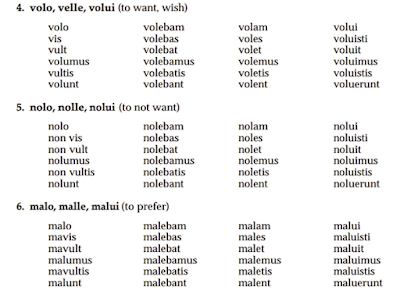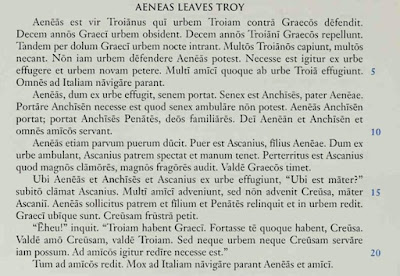The identical text from the last post but, this time, we’ll
briefly review other aspects of the language covered in previous posts. I will
only focus on [i] the uses of the cases that are in the text and [ii] briefly
on adverbs.
_____
Intereā in vīllā Corneliānā
omnēs strēnuē labōrant. Aurēlia tunicam et stolam et
pallam gerit. Ancillam iubet aliās tunicās et stolās et pallās in
cistam pōnere. Mārcus et Sextus tunicās et togās praetextās gerunt quod initinere et
in urbe togās praetextās līberī gerere solent. Servus aliās
tunicās et togās praetextās in cistam pōnit. In cubiculō Gaiī servus
togās virīlēs in cistam pōnit quod Gaius in urbe togam
virīlem gerere solet. Gaius ipse togam virīlem induit.
Dāvus, quī ipse omnia cūrat, ad iānuam stat.
Servōs iubet cistās ē cubiculīs in
viam portāre. Baculum habet et clāmat, "Agite, servī scelestī!
Dormītisne? Hodiē, nōn crās, discēdimus."
Mārcus quoque servōs incitat et iubet eōs cistās in raedam pōnere.
Servus quīdam, nōmine Geta, cistam Sextī arripit
et in raedam iacit.
"Cavē, Geta!" exclāmat Sextus sollicitus.
"Cūrā cistam meam! Nōlī eam iacere!" Tandem omnēs
cistae in raedā sunt. Ascendunt Mārcus et Sextus. Ascendit
Eucleīdēs. Ascendit Aurēlia. Gaius ipse ascendere est parātus. Syrus,
raedārius, quoque ascendit et equōs incitāre parat. Subitō exclāmat
Aurēlia, "Ubī est Cornēlia?"
Eō ipsō tempore in viam currit
Cornēlia. Eam Gaius iubet in raedam statim ascendere. Statim raedārius equōs
incitat. Discēdunt Cornēliī.
____________________
Case Usages
[1] Nominative: the subject of the
sentence; the person or thing performing the action
Dāvus … ad iānuam stat. │ Davus …
is standing at the door.
"Ubī est Cornēlia?" │ Where is Cornelia?
Togās praetextās līberī gerere solent. │ Children usually
wear the toga praetexta.*
Discēdunt Cornēliī. │ The Cornelii [i.e.
the whole Cornelius family] depart.
*toga praetexta: a type of white toga with a purple
border that was worn by freeborn boys and some freeborn girls, before they came
of age. However unpleasant it may sound, one of the reasons was to ward off
sexual predators and keep the youngsters safe from immoral influence.
[2] Vocative: there is little that needs to be said about
this case; it is used when addressing people directly e.g.
‘Hi, John!” In almost all instances, the nominative and the vocative case are
the same.
"Cavē, Geta!" │ “Be careful, Geta!”
"Agite, servī scelestī!” │ “Get a move on,
wicked slaves!”
The reason why it’s listed as a separate case is because
masculine nouns ending in -us change to -e:
Mārcus > Salvē Mārce! │ Hello, Marcus!
And you will see it with masculine nouns in -ius > -ī:
Iūlius > Salvē, Iūlī! │Hello, Julius!
meus fīlius: my son > Ō mī fīlī!
│ Oh, my son!
The text itself does not give examples of that change.
When I list tables, I don’t include the vocative unless
there is a change because, beyond the limited changes I’ve mentioned here, it’s
always the same as the nominative. There’s no purpose in thinking that there is
an entire set of endings under the heading of ‘vocative’ that need to be
studied.
[3] Accusative
[i] the direct object of the sentence; the
person or thing that is being affected by the action
Aurēlia [nominative] tunicam [accusative]
et stolam [accusative] et pallam [accusative] gerit.
│ Aurelia is wearing a tunic, a dress and a
shawl.
Raedārius [nominative] equōs [accusative]
incitat. │The coachman spurs on the horses.
Servōs [accusative] iubet ... │ He orders the
slaves
Servus [nominative] tunicās [accusative]
et togās [accusative] … in cistam pōnit. │The slave puts the tunics
and the togas into the chest.
Baculum habet. │ He has / holds a stick.
"Cūrā cistam meam! Nōlī eam iacere!"
│ Look after my chest! Don’t throw it!
Iubet eōs [accusative] cistās [accusative]
in raedam (see note [ii] below) pōnere. │ He orders them to
put the chests into the carriage.
[ii] used with certain prepositions
ad + accusative: at / towards
Dāvus … ad iānuam stat. │ Davus
… is standing at the door.
in + accusative: into / onto
Servus … togās [accusative; direct object] ¦ in cistam [preposition in +
accusative] pōnit. │ The slave puts the togas ¦ into the
chest.
Cistam [accusative; direct object] Sextī arripit
et in raedam [preposition in +
accusative] iacit. │ He snatches Sextus’s chest and throws
(it) ¦ into / onto the carriage.
Iubet eōs [accusative] cistās [accusative]
¦ in raedam. [preposition in +
accusative] │ He orders them to put the chests ¦ into
the carriage.
In viam currit Cornēlia. │ Cornelia
runs into the street.
[3] Genitive: possession; the “owner” of the
thing, like English ‘John’s book’
In cubiculō ¦ Gaiī [genitive]│in Gaius’
bedroom [literally: in the bedroom of Gaius]
Cistam ¦ Sextī arripit. [genitive] │ He
seizes Sextus’ trunk. [literally: the trunk of Sextus]
[4] Ablative
This case has many uses which have been discussed along the
way since the group started. You cannot learn all the uses at the same time
because there are simply too many. I will refer to the ones here, two of which
are very common:
[i] preposition in + ablative; this is
different from in + accusative referred to in [2](ii) above:
in + accusative: into / onto something
i.e. movement from one place into another
in + ablative: in i.e. no movement; it refers to
the location
in vīllā │ in the villa
in urbe │ in the city
in itinere │ on the journey
(when travelling)
in cubiculō [ablative] Gaiī
[genitive] │in Gaius’ bedroom [literally: in the
bedroom ¦ of Gaius]
Omnēs cistae in raedā sunt. │
All the chests are in / on the carriage.
[ii] preposition ē / ex: out of
Servōs iubet cistās ¦ ē cubiculīs ¦
in viam portāre. │ He orders the slaves to carry the chests ¦ out of
the bedrooms ¦ into the street.
[iii] multiple uses almost all of which function as
adverbial phrases i.e. expressing, for example, how something was done or when
it was done or what was used to do it or for what reason. The ablative can’t be
explained in a handful of words, but it is giving additional information to
whatever the main point is.
Servus quīdam, nōmine Geta │a certain
slave by the name of Geta [i.e. called Geta]
eō ipsō tempore │
at that very time
*** The dative case is not used in this
text, and so I will review that separately. ***
[iv] Note! There is a difference between what we classify as
an adverb and an adverbial phrase:
In English an adverb is a single word, and there are
examples in the text
[i] Many adverbs in Latin are formed from the adjective
strenu¦us, -a, -um: strenuous; active > strēnu¦ē
Omnēs strēnuē labōrant: everybody is working
actively.
[ii] Latin also has a large number of adverbs which, like
English, have their unique forms; many adverbs and adverbial phrases refer to
time (in grammar they’re called temporal adverbs)
crās: tomorrow
hodiē: today
intereā: meanwhile; in the meantime
quoque: also
statim: immediately
subitō: suddenly
tandem: at length; finally
[iii] But, as mentioned in the ablative notes, the ablative
can create many phrases which have an adverbial function i.e.
the individual words are not adverbs but, when combined, form a phrase that has
that function:
eō ipsō tempore │
at that very time (an adverbial phrase; temporal i.e. referring to time)
[iv] One more small point to “throw in” which hasn’t been
mentioned in earlier posts:
"Cavē, Geta!" exclāmat Sextus sollicitus.
│ “Be careful, Geta!” shouts Sextus, worried.
sollicitus, -a, -um: disturbed; worried; anxious, an
adjective describing Sextus. Latin sometimes uses adjectives to describe the
emotion of the person performing the action which, more
naturally in English translation, would become an adverb describing the
emotion of the way it was done; of course, ‘… shouts a
worried / concerned Sextus’ is grammatically correct but,
depending on context, can sound a bit clumsy. In situations like that, the
sentence could be reworked:
“Be careful,” shouts Sextus ¦ who is anxious, or, better I
think, “Be careful,” shouts Sextus anxiously.
















